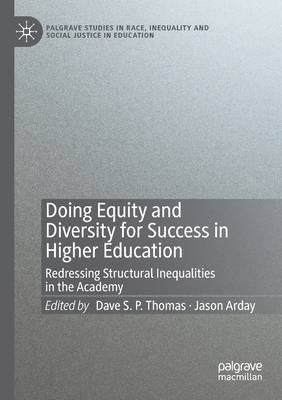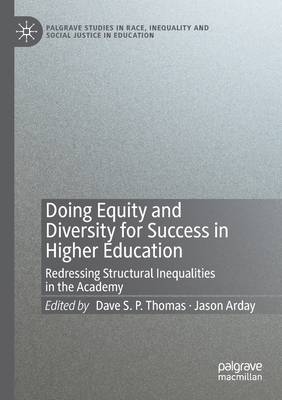
Door een staking bij bpost kan je online bestelling op dit moment iets langer onderweg zijn dan voorzien. Dringend iets nodig? Onze winkels ontvangen jou met open armen!
- Afhalen na 1 uur in een winkel met voorraad
- Gratis thuislevering in België vanaf € 30
- Ruim aanbod met 7 miljoen producten
Door een staking bij bpost kan je online bestelling op dit moment iets langer onderweg zijn dan voorzien. Dringend iets nodig? Onze winkels ontvangen jou met open armen!
- Afhalen na 1 uur in een winkel met voorraad
- Gratis thuislevering in België vanaf € 30
- Ruim aanbod met 7 miljoen producten
Zoeken
Doing Equity and Diversity for Success in Higher Education
Redressing Structural Inequalities in the Academy
€ 158,45
+ 316 punten
Omschrijving
This book provides a forensic and collective examination of pre-existing understandings of structural inequalities in Higher Education Institutions. Going beyond the current understandings of causal factors that promote inequality, the editors and contributors illuminate the dynamic interplay between historical events and discourse and more sophisticate and racialized acts of violence. In doing so, the book crystallises myriad contemporary manifestations of structural racism in higher education. Amidst an upsurge in racialized violence, civil unrest, and barriers to attainment, progression and success for students and staff of colour, doing equity and diversity for success in higher education has become both politically urgent and morally imperative. This book calls for a redistribution of power across intersectional and racial lines as a means of decentering whiteness and redressing structural inequalities in the academy. It is essential reading for scholars of sociology and education, as well as those interested in equality and social justice.
Specificaties
Betrokkenen
- Uitgeverij:
Inhoud
- Aantal bladzijden:
- 352
- Taal:
- Engels
- Reeks:
Eigenschappen
- Productcode (EAN):
- 9783030656706
- Verschijningsdatum:
- 20/06/2022
- Uitvoering:
- Paperback
- Formaat:
- Trade paperback (VS)
- Afmetingen:
- 148 mm x 210 mm
- Gewicht:
- 508 g

Alleen bij Standaard Boekhandel
+ 316 punten op je klantenkaart van Standaard Boekhandel
Beoordelingen
We publiceren alleen reviews die voldoen aan de voorwaarden voor reviews. Bekijk onze voorwaarden voor reviews.










